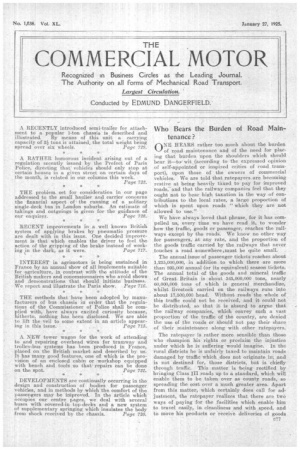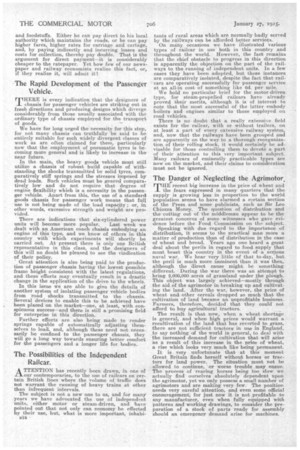Who Bears the Burden of Road Maintenance?
Page 1

Page 2

If you've noticed an error in this article please click here to report it so we can fix it.
fINE HEARS rather too much about the burden ‘--,F of road maintenance and of the need for placing that burden upon the shoulders which should 'bear it—t&' wit (according to the expressed opinion of self-appointed or inspired critics of road transport), upon those of the owners of commercial vehicles. We are told that ratepayers are becoming restive at being heavily taxed to pay for improved roads,—and that the railway companies feel that they ought not to bear high taxation in the way of contributions to the local rates, a large proportion of which is spent upon roads "which they are not allowed to use."
We have always loved that phrase, for it has compelled us, every time we have read it, to wonder how the traffic, goods or passenger, reaches the railways except by theroads. We know no other way for passengers, at any rate, and the proportion of the goods traffic carried by the railways that never touches a road somewhere must be quite small.
The annual issue of passenger tickets reaches about 1,235,000,000, in addition to which there are more than 895,000 annual (or its equivalent) season tickets. The annual total of the goods and mineral traffic of Great. Britain is about 345,000,000 tons, nearly 60,000,000 tons of which is general merchandise, whilst livestock carried on the railways runs into about 17,500,000 head. Without roads the whole of this traffic could not be received, and it could not be distributed, so that it is absurd to argue that the railway companies, which convey such a vast proportion of the traffic of the country, are denied the use of the roads or should not pay their share of their maintenance along with other ratepayers.
The ratepayer is rather more sensible than those who champion his rights or proclaim the injustice under which he is suffering would imagine. In the rural districts he is unfairly taxed to maintain roads damaged by traffic which does not originate in; and is not destined for, those districts, but is chiefly through traffic. This matter is king rectified by bringing Class III roads up to a standard, which will enable them to be taken over as county roads, so spreading the cost over a much greater area. Apart from this matter, which certainly does call for adjustment, the ratepayer realizes that there are two ways of paying for the facilities which enable him to travel easily, in cleanliness and with speed, and to move his products or receive deliveries of goods
and foodstuffs. Either he can pay direct to his local authority which maintains the roads, or he can pay higher fares, higher rates for carriage and cartage, and, by paying indirectly and incurring losses and costs for collection, thereby pay double. That is the argument for direct payment—it is considerably cheaper to the ratepayer. Yet how few of our newspaper and railway economists realize this fact, or, if they realize it, will admit it?
The Rapid Development of the Passenger Vehicle.
TfERE is every indication that the designers of chassis for passenger vehicles are striking out in fresh directions and producing designs which diverge considerably from those usually associated with the ordinary type of chassis employed for .the transport of goods.
We have for long urged the necessity for this step, for not many chassis can truthfully be said to be entirely suitable for such widely divergent classes of work as are often claimed for them, particularly now that the employment of pneumatic tyres is bedoming more general and is likely to increase in the near future.
In the main, the heavy goods vehicle must still utilize a chassis of robust build capable of withstanding the shocks transmitted by solid tyres, comparatively stiff springs and the stresses imposed by dead loads. Such vehicles must be geared comparatively low and do not require that degree of engine flexibility which is a necessity in the passenger vehicle. Apart from this, the use of a standard goods chassis for passenger work means that full use is not being made of the load capacity or, in other words, excessive strength and weight are provided.
There are indications that six-cylindered power
units will become more popular. Last week we dealt with an American coach chassis embodying an engine of this type, and we know of others in this country with which experiments will shortly be carried out. At present there is only one British representative in this class, and the designers of this will no doubt be pleased to see -the vindication of their policy.
Great attention is also being paid to the production of passenger chassis having the lowest possible frame height consistent with the latest regulations, and these efforts may eventually result in a drastic change in the application of the drive to the wheels..
In this issue si-e are able to give the details of another system a of isolating passenger vehicle bodies from road shocks transmitted to the chassis. Several devices to enable this to be achieved have been placed on the market—one, at feast, with conspicuous success—and there is still a proinising field for enterprise in this direction.
Further efforts are also being made to render springs capable of automatically adjusting themselves to loaa, and, although these need not necessarily be confined to the passenger chassis, they will go a long way towards ensuring better comfort for the passengers and a longer life for. bodies.
The Possibilities of the Independent Railcar.
ATTENTION has recently been drawn, in one of our contemporaries, to the use of railcars on certain British lines where the volume of traffic does not warrant the running of heavy trains at other than infrequent intervals.
The subject is not a new one to us, and for many years we have advocated the use of independent units, either motor or steam-driven, and have pointed out that not only can economy be effected by .their use, but, what is more important, inhabi
MS • tante of rural areas which are normally badly served by the railways can be afforded better services. On many, occasions we have illustrated various types of railcar in use both in this country And throughout the world. However, the fact remains that, the chief obstacle to progress in this direction is apparently the objection on the part of the railways to the running of independent units. In a few cases they have been adopted, but these instances are comparatively isolated, despite the fact that railcars are operating successfully for passenger service at an all-in cost of something like ad. per mile, We hold no particular brief for the motor-driven type, for steam-propelled railcars have already proved their merits, although it is of interest to note that the most successful of the latter embody boilers and engines similar to those employed on road vehicles.
There is no doubt that a really extensive field exists for the railcar, with or without trailers, on at least a part of every extensive railway system, and, now that the railways have been grouped and are apparently on the way to a thorough reorganization of their rolling stock, it would certainly be advisable for those controlling them to devote a part of their attention to this very important subject. Many railcars of eminently practicable types are now on the market, and their claims to consideration must not be ignored.
The Danger of Neglecting the Agrimotor
THE recent. big increase in the price of wheat and the fears expressed in many quarters that the supply is growing less in proportion to the world population seems to have alarmed a certain section of the Press and some publicists, such as Sir Leo Chiozza, Money. The question of distribution and the cutting out of the middleman appear to be the greatest concerns of some witnesses who gave evidence before the Food Commission on the subject.
Speaking with due regard to the importance of distribution, it seems to the neactical man more a matter of production than of distribution in the ease of wheat and bread. Years ago one heard a great deal about the perils in regard to food supply that must beset this country in the event of a serious naval war. We hear very little of that to-day, but the peril is much more imminent than it was then, although the direct cause might be something different. During the war there was an attempt to bring 2,000,000 acres of grassland under -the plough. This object was largely achieved—mostly through the aid of the agrimotor in breaking up and cultivating the land. After the war, however, the price of wheat and other cereals dropped so much that the cultivation of land became an unprofitable business. Farmers therefore, decided that they could not afford to ; buy agricultural tractors.
The result is that now, when a wheat shortage is general, and when high prices would warrant a recultivation of the land that has reverted to grass, there are not sufficient tractors in use in England, to say nothing of the world in general, to deal with the increased demand for cultivation that will arise as a result of this increase in the price of wheat, a rise which looks very much like being permanent.
It is very unfortunate that at this moment Great Britain finds herself without horses or tractors for land power. The situation must not be allowed to continue, or worse trouble may ensue. The process of rearing horses being too slow we actually find ourselves absolutely dependent upon the agrunotor, yet we only possess a small number of agrimotors and are making very few. The position needs very careful attention, and even some official encouragement, for just now it is not profitable to any manufacturer, even when fully equipped with patterns and working drawings, to consider the preparation of a stock of parts ready for assembly should an emergency demand arise for machines.






























